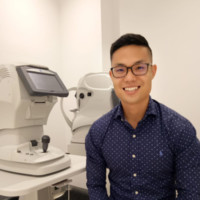Your eyesight is a vital part of your daily life that you rely on for many activities.
Whether reading, driving, or watching television, seeing clearly is crucial to your well-being. However, sometimes your vision can falter, and knowing what to do is important if that happens.
In this blog post, we’ll go over the steps you should take if you have vision problems and how to ensure you get the proper care you need.
Steps You Should Take If You’re Having Vision Problems

Don’t Panic
The first step to take if you’re experiencing vision problems is to remain calm. While feeling anxious or scared is understandable, panicking or getting stressed can worsen the situation, so take a deep breath and relax.
Remember those vision problems can be caused by various factors, ranging from simple eye strain to more severe conditions, so don’t immediately assume the worst.
Schedule an Appointment with an Eye Specialist
The next step is to schedule an appointment with an eye specialist as soon as possible.
Eye specialists, like ophthalmologists or optometrists, can perform a series of tests to determine the cause of your vision problems and recommend an appropriate course of treatment.
Some common tests may include visual acuity tests, refraction tests, and dilation exams.
Make Lifestyle Changes
Sometimes, vision problems can be caused or aggravated by certain lifestyle factors. For example, suppose you spend extended periods staring at a computer screen or mobile device. In that case, you may be straining your eyes, leading to symptoms like headaches, blurred vision, and dry eyes.
Similarly, if you smoke, you may be increasing your risk of developing eye conditions like cataracts or macular degeneration.
Making positive lifestyle changes, like taking frequent breaks from screens, quitting smoking, or maintaining a healthy diet and exercise routine, can help alleviate symptoms and prevent future eye problems.
Consider Vision Corrective Measures
If your eye specialist determines that you require vision corrective measures, such as glasses, contact lenses or surgery, they will advise you accordingly. Vision corrective measures can help you regain your vision and improve your quality of life, but it is important that you work with your eye specialist closely to ensure that you get the best solution that suits your specific needs.
Follow Up Regularly
Finally, after you have received proper treatment or corrective measures, it is important to stay in touch with your eye specialist and follow up regularly. Depending on your specific condition, your eye specialist may require frequent check-ups or exams to ensure that your vision is stable and no new complications arise. By following up regularly, you can stay on top of your eye health and identify any issues before they become bigger problems.
Trust Your Vision to Beyond Eyecare

If you’re having vision problems, seeking the help of Beyond Eyecare is a great starting point. Our team has years of experience and highly advanced equipment to ensure they can diagnose any issues quickly and accurately.
Additionally, our staff have the knowledge to provide comprehensive treatment plans that address immediate needs and ongoing management. Furthermore, we pride ourselves on maintaining an open relationship with our patients to find the right solution for them.
You no longer have to worry about finding someone who can provide effective care, give us a call today for help getting your vision back on track!
Frequently Asked Questions
What Are Common Vision Problems?
Some common vision problems include refractive errors such as nearsightedness, farsightedness, astigmatism, age-related macular degeneration, cataracts, and diabetic retinopathy. People who wear contact lenses may also experience complications such as corneal ulcers or infections.
What Are the Symptoms of Serious Eye Problems?
Symptoms of serious eye problems may include sudden changes in vision, such as flashing lights or the sudden appearance of many floaters, as well as blurred or distorted vision. Other symptoms may include eye pain or redness, headaches, and a family history of eye disease. Patients with high blood sugar and blood pressure may also be more susceptible to eye problems.
What Can Cause Sudden Changes in Vision?
Various factors, including neurologic disorders, ocular hypertension, and pediatric physical diagnosis, can cause sudden vision changes. Additionally, some medications may cause changes in vision as a side effect. Any sudden vision changes should be taken seriously and evaluated by an eye doctor as soon as possible to rule out any underlying conditions.

Therapeutical endorsement





